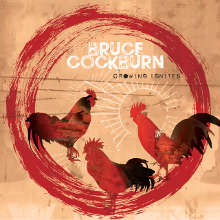The Graham Album Review #2002

Click on CD Cover for Audio Review in streaming mp3 format | |
Bruce Cockburn: Crowing Ignites
by George Graham
(True North Records as broadcast on WVIA-FM 10/23/2019)

Click on CD Cover for Audio Review in streaming mp3 format | |
Bruce Cockburn: Crowing Ignites
by George Graham
(True North Records as broadcast on WVIA-FM 10/23/2019)
By definition, a singer-songwriter performs vocally. Not many are known for their instrumental prowess. They play their instruments mainly to accompany their songs. But there are some singer-songwriters who are worthy instrumentalists. This week, we have one such, a Canadian artist who has been on the scene now for nearly 50 years, and who is said to have written more than 300 songs, Bruce Cockburn, who has just released his 33rd album, an all-instrumental recording called Crowing Ignites.
A native of Ottawa, Bruce Cockburn showed his musical tendencies in high school, and after graduating, went to Paris and busked on the streets. Later in 1964, he enrolled in the Berklee College of Music in Boston, where he stayed for three years, studying jazz composition, before dropping out to join a band back in Ottawa. He was in a succession of rock bands, until 1969 when he launched his solo career as a folk-style artist, and the following year released his his eponymous debut album, which I think is a classic and made me a fan ever since. Over the years, Cockburn has been consistently popular in Canada, with 22 of his album receiving gold or platinum status in north of the border. His first significant American commercial success came in 1979 with his song Wondering Where the Lions Are, from his album Dancing in the Dragons’s Jaws. Cockburn has been known for his songs of social activism and Christian themes. His recordings have spanned acoustic solo to electric band projects. And throughout most of his career, he has generally included one or two instrumental tracks on each of his albums. He previously released Speechless in 2005 a compilation of some of those instrumentals, and now he is out with a new instrumental album Crowing Ignites.
This is a mostly acoustic, largely solo recording of music than ranges from what used to be called new age, to rural blues, to rather spacey. It’s tasteful and reserved. The playing is not designed to be particularly flashy, but the music is evocative nonetheless, with some interesting sonic colors. There are a few people who join him on the album, including his long-time producer Colin Linden who plays additional guitar, and bass along with some mandolin on one track. There are also keyboards played by Janice Powers. About the only other thing on the album, is some assorted light percussion. Cockburn plays various kinds of acoustic guitar, and also electric guitar on one track. The compositions are not strong on melody, but tend to be more textural.
Opening is a piece called Bardo Rush which is reminiscent of some of Cockburn’s previous guitar instrumentals which have been interspersed on his otherwise vocal albums. It starts out as a solo guitar piece, but then Janice Powers’ keyboard enters and gives it rather ominous quality. <<>>
One solo guitar piece is called Easter, which Cockburn writes in his album notes was conceived on Easter Sunday, 2018. It’s attractive in sound and builds from a contemplative mood to more upbeat folky picking. <<>>
A track called April In Memphis has the sound of an elegy, which is not the kind of music you would expect inspired by Memphis. But Cockburn writes that it was written on Martin Luther King Day. King, of course, was assassinated in April 1968 in Memphis. <<>>
The bluesier side of the album is represented on the track Blind Willie, named after the bluesman Blind Willie Johnson. Producer Colin Linden is heard on the Dobro. <<>>
Cockburn’s jazz influenced side comes out on a piece called The Mount Lefroy Waltz. It’s played on electric guitar and is essentially done with a jazz group with bass, drums and cornet. <<>>
The well-named composition Sweetness and Light is a joyful sounding folk guitar solo. <<>>
A rather different-sounding solo performance is heard on Angels in the Half Light, which takes on a rather ominous sound. <<>>
Cockburn includes a piece with some Celtic influence, Pibroch: The Wind in the Valley. The keyboards provide hints of a bagpipe drone along with a kind of other-worldly ambiance. <<>>
One of Canada’s best-known folksingers, Bruce Cockburn has been recording for almost 50 years, and he has amassed quite a catalog of releases. His fans know him as a multifaceted artist whose influences include folk, jazz, blues and social activism. His guitar work on his albums has always been outstanding, so it was only fitting that he release another album of instrumentals. It’s a mostly contemplative and folky sounding record, but the music is quite impressionistic. The title, Crowing Ignites turns out to be a translation of a Cockburn family motto that he found in Latin, “Accendit Cantu.”
Our grade for sound quality is close to an “A.” The acoustic guitars are well captured. There are some studio effects, but they are generally unobtrusive.
At age 74, Bruce Cockburn continues his prolific recording career with a pleasing detour from his usual literate fare.
(c) Copyright 2019 George D. Graham. All rights reserved.
This review may not be copied to another Web site without written permission.
 To Index of Album Reviews | To George Graham's Home Page. | What's New on This Site.
To Index of Album Reviews | To George Graham's Home Page. | What's New on This Site.